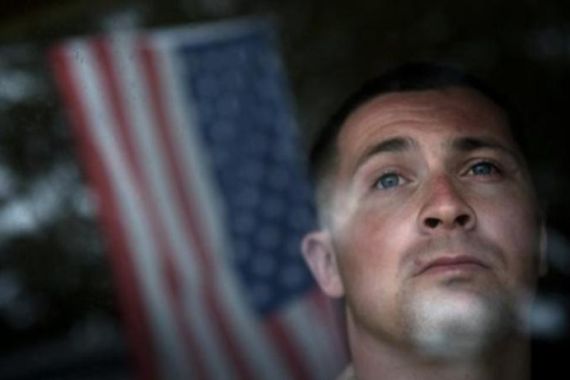US military court grants Iraq marine’s appeal
Sergeant Lawrence Hutchins, convicted of murdering an Iraqi civilian in 2006, argues he was unlawfully interrogated.

The US military’s highest court has agreed to hear the appeal of a Marine convicted of murder in one of the most significant criminal cases to come out of the Iraq war.
The Court of Appeals for the Armed Forces on Monday ordered a review requested by Sergeant Lawrence Hutchins III, who claimed in a petition that his constitutional rights were violated when he was held in solitary confinement without access to a lawyer for seven days during his interrogation and that Navy Secretary Ray Mabus unlawfully influenced his case after his conviction.
Hutchins, 26, of Plymouth, Massachusetts, led an eight-man squad accused of kidnapping retired Iraqi policeman Hashim Ibrahim Awad from his home in April 2006, marching him to a ditch and shooting him to death.
The killing took place in Hamdania, a small village in Al Anbar province.
The six other Marines and a Navy corpsman in his squad each served less than 18 months.
Hutchins has sought clemency and early release, saying he was deeply sorry for what happened and has suffered nightmares and anxiety because of the killing.
Those requests have been denied, Hutchins claimed in the appeal, because Mabus illegally interfered in the case and influenced court officers to rule against release.
Mabus has said that the killing did not happen in the fog of battle but was a carefully planned attack and cover-up.
Neither the secretary nor officials from his office could be reached for comment late Monday night, but Mabus’ office has said previously he is precluded from commenting on Hutchins’ case because it is under appeal.
Twists and turns
The appeals court has also agreed to consider whether Hutchins’s rights were violated when the he was interrogated by the Naval Criminal Investigative Service, whose investigators ended his 2006 interrogation when he invoked his right to an attorney, according to the document granting the review.
But he was held in solitary confinement for seven days with no access to a lawyer or anyone else he could ask for help. Investigators then resumed their questioning, and Hutchins waived his right to counsel and provided a sworn statement about the crimes.
Hutchins and his attorney are arguing that the trial judge erred when he denied a motion to suppress the statement.
“The ongoing and persistent political interference in this case has been unconscionable, and the fact that the highest military court has to reasonably ask itself if the Secretary of the Navy has unlawfully manipulated the process means that, regardless of who is ultimately victorious, the integrity of the military justice system as a whole has already been fatally compromised,” Hutchins’ attorney, Major Babu Kaza, said in a statement.
“It is our sincere hope that justice is finally done in this case.”
The move is the latest in a series of twists and turns in the case of Hutchins, whose case was already overturned once by a court that ruled his 2007 trial was unfair because his lead defense lawyer quit shortly before it began.
The same court that accepted his new petition overruled that decision, saying the problem was not grave enough to throw out the conviction. Hutchins was returned to the brig after eight months working at a desk job at Camp Pendleton in southern California.
He has served about five years of an 11-year sentence, and is set to be released in July 2015 at the earliest.